3 Months from the Islamic State Shock – Change of US Strategy for Air-Strikes and Encirclement
By Ikuzo Kobayashi, President of Salaam Association
From the Winter issue of the electronic Salaam Quarterly Bulletin, No.12, November 2014
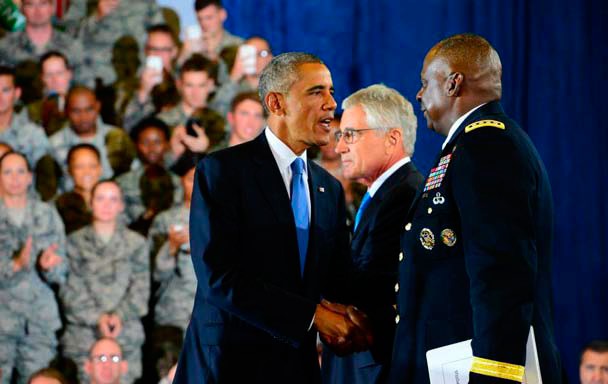
President Barack Obama shakes hands with Army Gen. Lloyd J. Austin III, commander of U.S. Central Command, on MacDill Air Force Base in Tampa, Fla., Sept. 17, 2104. Obama traveled to the base to speak with troops and meet with Centcom leaders to discuss the fight against the Islamic State in Syria and the Levant.U.S. Central Command photo
The Islamic State of Iraq and Syria (ISIS) proclaimed establishment of the Islamic State and appointed Abu Bakr al-Baghdadi as the caliph (a successor of the prophet Muhammad) out of the blue. The Sunni militant group escalated violence through highly trained military fighters and propaganda tactics to publicize extremely gruesome executions through the Internet. Their violence shocked the world and caused the concern about liquefaction of the national borders of the Middle East. The United States has failed to implement an effective strategy to cope with the Syrian civil war and was forced to reevaluate her Middle East strategy. After three months of relative inaction, Obama Administration launched air-strikes and the strategy of encirclement by the coalition of the willing.
Mr. Kunihiko Miyake proactively reported the seriousness of the development
Mr. Kunihiko Miyake, Chief Researcher of the canon Global Strategy Research Institute and Middle East analyst, contributed an opinion article titled “Liquefaction of Fertile Crescent” in “World Watch” column of the Sankei Shimbun on June 19. Mr. Miyake frankly shared his feeling, stating that he was “shocked” by the fact that ISIS seized control of Mosul, second largest city on Iraq, on June 10. He further stated, “Why was I unable to predict this. As a Middle East analyst, I was deeply ashamed,” and introduced his note dated January 6.
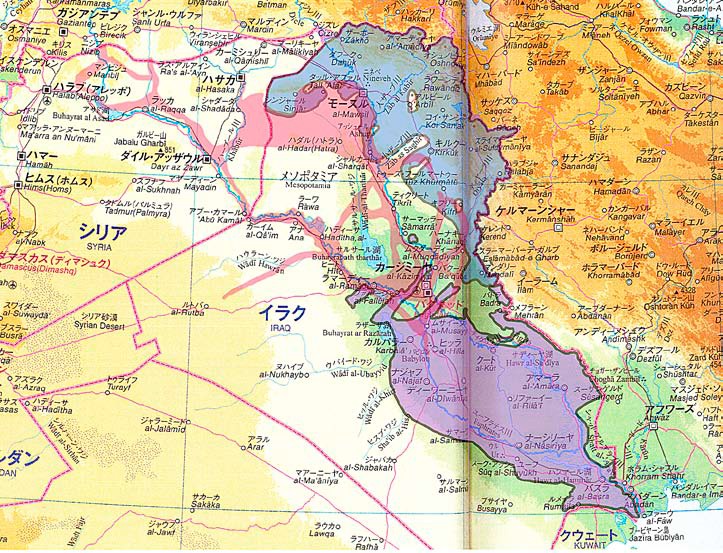
“What shocked me first on January 1 was the new that ISIS seized control of Fallujah. … Fallujah is a Sunni stronghold where the US military conducted a large-scale mop-up operation in the spring of 2004. It is a town famous for the fact that three young Japanese became “hostages” there around the same time. It has been 10 years since then. … Fallujah was a stronghold of Al Qaeda of Iraq, but the U.S. troop’s mopup operation did not succeed after all. Subsequently, the terrorism of armed militants spread throughout Iraq. …” I quoted a long paragraph to refresh readers’ memory about the situation back then. Mr. Miyake was shocked by the development in which what he feared materialized after 10 years.
Iraqi situation in a decade after arrest of Saddam Hussein
1) Arrest of Saddam Hussein
With arrest of Saddam Hussein in Iraq onDecember 14, 2003, the United States hoped for the new start of newly-emerged Iraq. However, the divergence between the United States’ idea about democratization of Iraq and Arab countries’ idea democratization continued. Right after arrest of Saddam Hussein, governments of Saudi Arabia, Syria and Lebanon did not care about whether Iraq becomes a democratic country or not, and all they desired was that “Iraq becomes a country which does not invade their territories.” Egypt, Morocco and Kuwait more or less hoped that Iraq becomes “a country which can establish a good economic relationship with them.” The mistrust toward the United States deeply held among Arab countries causes Arab countries to believe that “democratization means becoming a country obedient to the United States.” Even with regard to dispatch of the Japanese Self-Defense Force to Iraq, the general view held among Arab countries was that “Japan fears the United States and reluctantly goes along with the pressure from her.” Although they wholeheartedly welcomed humanitarian and economic reconstruction assistances from Japan, they openly stated that they desire that “the United States quickly wraps up the occupation of Iraq and gets out of Iraq.”
Back then, the idea of pro-US Arab countries such as Egypt, Jordan and Tunisia about democratization was that they “should absorb people’s increasing demand for democratization, avoid the West’s direct intervention for democratization and present a democratization plan.” However, they have never come to a consensus agreement on this in the Arab League meetings.
2) Transfer of power by US Bush Administration
The United States has been unable to overcome the divergence with Arab countries. On January 20, 2004, President Bush in his State of Union address invited the Iraqi Governing Council President Adnan Pachachi and expressed his hope that the Iraqis “create a free and peaceful nation.” The State of Union address was an occasion to announce to the world the plan to complete transfer of power to the Iraqis by June 30, 2004 which was prepared and agreed by the Coalition Provisional Authority (CPA) led by the United States and the Iraqi Governing Council on November 15, 2003.
However, armed Sunni mi l itants brutally murdered four Americans in Fallujah and militants led by Shiite cleric Muqtada al-Sadr killed US soldiers in Baghdad at the end of March, 2004. The violence subsequently escalated. Militants working with cleric Sadr launched attacks in four cities in southern Iraq, occupied government buildings and secured the promise for withdrawal of the US troops. (Cited from Former Quarterly Salaam No. 22, 3P, the article by Hideaki Kubota) Under these conditions, there was increasing debate about whether June 30 deadline for the transfer of power should be kept. However, President Bush implemented the transfer of power to the Iraqis without any modification. He entrusted then United Nations Special Envoy Lakhdar Brahimi a mission to persuade the Iraqis to accept division of power among Sunnis, Shiites and Kurdish tribes as the base of the interim government. The United States also requested more than ten countries to join the multinational forces to protect the United Nations delegation in Iraq. The Department of State obtained the United Nations’ approval for the US-led coalition forces to be deployed after June 30. The US thus provided the newly formed Iraqi regime with legitimacy in the international community and defined the United Nations’ role in Iraq. (Cited from Former Quarterly Salaam No. 22, 4-5P, summary of the article by Hideaki Kubota)
3) Political process of the newly-formed Iraq
The political process in Iraq included the transfer of power from the Coalition Provisional Authority to the Iraqi interim government on June 28, 2004, parliamentary elections (voting rate 58%) on January 30, 2005, start of the transitional government, the national referendum on the draft constitution and approval of the constitution, and parliamentary elections based on the new constitution on December 15, 2005. On April 22, 2006, Iraqi Parliament Speaker al-Mashhadani and President al-Talabani (Kurdish) were elected. On May 20, 40 members of the Cabinet were approved and the new Iraqi government with 4-year tenure was established. President al-Talabani appointed Prime Minister al-Maliki (Shiite), and the Iraqi Parliament approved the draft agreement on stationing of the US troops on November 27, 2008, and the second Maliki Administration started on December 20, 2010.
Political instability surfaced right after the complete withdrawal of the US troops
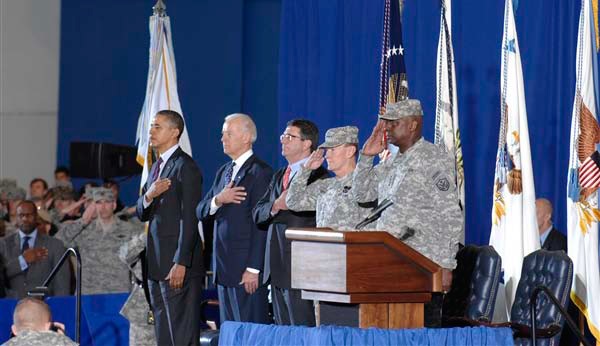
President Barack Obama, Vice President Joe Biden, Deputy Defense Secretary Ashton B. Carter, Chairman of the Joint Chiefs of Staff Army Gen. Martin E. Dempsey and Army Gen. Lloyd J. Austin III, the last commander of U.S. Forces-Iraq, joined family members of returning service members to welcome those final few troops home, Dec. 20, 2011, Joint Base Andrews, Md. DOD photo by Army 1st Sgt. Tyrone Marshall Jr
Stationing of the US troops in Iraq which lasted 8 years and 9 months ended and the troop withdrawal was completed on December 18, 2011. Immediately after that, on December 19, the Iraqi judiciary authority issued an arrest warrant against ① Iraqi Vice Presindet al-Hashimi (Sunni) for “violation of anti-terrorism statute.” Vice President al-Hashimi was accused of instructing bombing attacks against government and security force personnel. The Sunnis were angered and boycotted the parliamentary sessions. Kurdish tribes in the north supported Al-Hashimi and he was said to have fled to Kurdistan (Kurdish self-autonomy district) in northern Iraq. He warned in his interview with Arbil CNN, “Prime Minister al-Maliki is plunging this country into the crisis of sectarian confrontation. If sectarian confrontation intensifies again, Iraq may face the prospect for return of the US forces that have withdrawn.” He posed a question, “What do the peoples of Iraq and the United States call Prime Minister al-Maliki who concurrently serves as the supreme military commander, Minister of Defense, Minister of Interior and Minister of National Security?” and implicitly accused him of being a dictator.
As soon as the political situation became unstable, bombing terrorist attacks occurred at 14 dif ferent locations including Baghdad, the capital throughout Iraq in March, 2012, killing 44 people. The Arab League Summit meetings (21 countries and one organization in the membership) were barely held for three days from March 27. However, because the bombings coincided with the meetings, al-Maliki government lost face and the fragile security condition of Iraq after the withdrawal of Iraqi troops was revealed in Iraq and overseas.
Impact caused by the Islamic State
1) ISIS which took advantage of the Syrian civil war
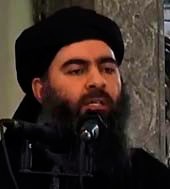
Abu Bakr al-Baghdadi
ISIS called itself as the Islamic State in the domain called Levant area which encompasses Syria and Iraq because it considered the area as controllable. It collaborated and split with Egyptian Islamic Jihad and Al Qaeda-affiliated al-Nusra Front in the process of the Syrian civil war. But its organizational core appears to be Al Qaeda in Iraq. Abu Bakr al-Baghdadi who was appointed as the caliph has the same name as Abu Bakr who became the first caliph. Baghdadi means “of Baghdad” so it is a name created from some kind of slogan.
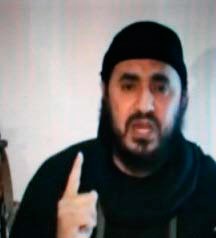
Abu Musab al-Zarqawi
Abu Musab al-Zarqawi, Jordanian leader of AQI who carried out large-scale indiscriminate terrorist attacks in Iraq repeatedly ( ② and who killed Mr. Shosei Koda) was killed by the US air strikes. Al-Zarqawi was a dangerous individual who considered Shiites and foreigners as “enemies of God” and carried out terrorism attacks against them. Immediately after his death, Al-Qaeda declared “continuation of jihad.” It is easily inferred that Al Qaeda-affiliated Egyptian Islamic Jihad sustained its presence and worked in solidarity with Arab Spring, especially anti-Assad Syrian groups.
However, Syrian groups which fought against Assad regime for democratization were fundamentally different from al-Nusra Front or Al Qaeda in Iraq in their mindset. Al-Nusra Front and Ai Qaeda in Iraq repeatedly fought to establ ish hegemony within anti-Assad movement.
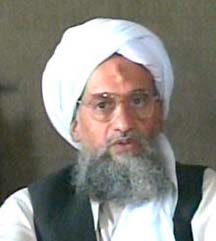
Ayman al-Zawahiri
Ayman al-Zawahiri who is considered to be the successor to Osama bin Laden uses the radical ideology of jihad struggles as a rallying call, inducing clash of civilizations. While his role as the center of militant terrorism has been weakened, Al Qaeda of Iraq joined Syrian civil war as an opportunity. Al Qaeda in Iraq had difference of opinions with al-Zawahiri, leader of Al Qaeda, and was excommunicated. It subsequently changed its name to the Islamic State in Iraq and Levant. Al Qaeda which directly aims at the United States and Europe and ISIS which takes advantage of anti-government struggles to solidify its regional foundation in Syria and Iraq are different in their strategy.
2) Islamic State’s unique view of the state
Al Qaeda and ISIS aim at expansion of Islamic community based on strict governance by Sharia. They consider not only the West but also Shiite or Sunni Muslims who do not promote jihad as the target of jihad. They promote propaganda to gain control over the global domain. However, they ③ apparently do not have local patriotism or love for history and culture of their people. Absolute faith in God is replaced with absolute loyalty forcaliph, and they are advancing toward a sovereign nation that is destined to become dictatorship. The basic components of the Western modern state, namely sovereignty, people and land, and the membership and prerequisite condit ions for the membership of the United Nations founded after the World War II are excluded from their discussions. ④ The right of survival or freedom of faith which should be guaranteed as basic human rights are ignored.
View on national borders established in the Western democracy
A state has a certain territory and is predicated on the effective control over the people who reside within the territory. In a sense, a state’s border is a line drawn as the result of confrontation and compromise between adversaries. In democratic societies, the significance and value of the border has been enhanced in connection with protection of national interests including basic human rights of the people within the border.
America is a nation of immigrants and formed the United States through federalism with the ideal of “one world under God” transcending religions and races. European countries evolved from the European Economic Community (EEC) to the European Union (EU) while maintaining borders and aim at a federation that can bring peace and prosperity. With such historical efforts as the background, the West has insisted that “change of the status quo by force is unacceptable” and refuses to recognize Russia’s annexation of Crimea. 24 years ago, in response to the action of Saddam Hussein regime of Iraq to send Iraqi forces to invade Kuwait, ⑤ the United Nations Security Council unanimously approved the resolution to condemn the invasion and demand immediate withdrawal of the Iraqi troops. In a similar way, it is natural that the West cannot recognize a state encompassing Syria and Iraq declared one-sidedly by theIslamic States using force with total disregard of borders. The “status quo” agreed between European countries and Syria, Iraq and Jordan as UN member nations was to confirm international borders that were unclear even after the World War I and the World War II.
Obama Administration decided on the showdown with the Islamic State.
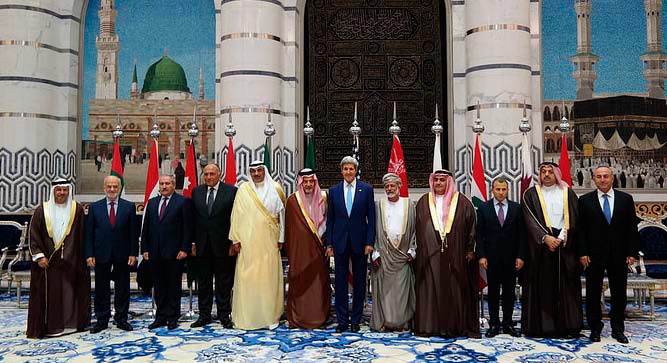
U.S. Secretary of State John Kerry poses for a photo with Gulf Cooperation Council (GCC) and Regional Partners meeting participants in Jeddah, Saudi Arabia on September 11, 2014. [State Department photo/Public Domain]
The US Obama Administration decided to adopt more aggressive policy and strategy against the Islamic State right after the Islamic State released the video showing gruesome beheading and “execution” of hostages through the Internet. The United States believes that the basic human rights are inalienable sacred rights endowed by God and acts to protect each individual’s rights by mobilizing nation’s entire power once those rights are threatened. President Obama declined to send the US ground forces, and instead announced air-strikes and the strategy of the coalition of the willing. This policy was announced while Republicans criticized the Administration and the US military leaders emphasized that “the ground forces are necessary.” The United States patiently waited until former Prime Minister al-Maliki was replaced by Prime Minister Haider al-Abadi and the new Iraqi cabinet of national unity was formed to launch air-strikes. The US announced the initiative of the “coalition of the willing” only after careful coordination with Persian Gulf countries. These actions ref lect the basic posture of the US that “the Iraqi government or the Syrian anti-government groups can be supported only if the country and the people who receive such support are firmly established.”
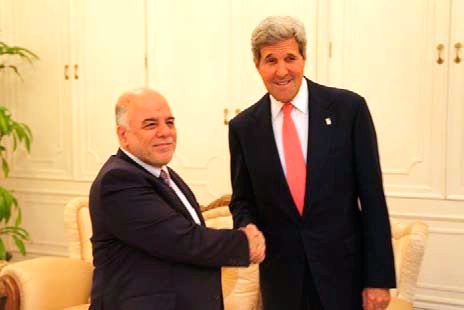
Secretary Kerry Meets With Iraqi Prime Minister al-Abadi U.S. Secretary of State John Kerry meets with Iraqi Prime Minister Haidar al-Abadi in Baghdad, Iraq on September 10, 2014. [State Department photo/ Public Domain]
The US believes that the central played in the issue of the Islamic State is Iraq, Syria or Arab, Islamic countries and the US strategy is based onthis belief. On September 22, US Secretary of State John Kerry stated in MSNBC television program, “The world expects the Middle East region to fight for themselves,” giving a glimpse of the United States’ real opinion.
Countries may have different national strategies and actions, but those countries which share the basic value of freedom and democracy must not hesitate in joining the “coalition of the willing” led by the United States to encircle the Islamic State. Japanese Prime Minister Abe expressed his willingness to join the coalition of the willing and promised to provide 2.8 billion yen assistance for refugees.
International laws without enforcement authority backed by military power do not have any effect on lawless groups. However, I want to believe that the coalition of the willing countries which have commitment to observe international laws and preserve the international order will demonstrate effective power. Currently, the United Nations does not have the UN military force and the UN resolutions are not expeditiously implemented. Under such circumstance, the coalition of the willing led by the United States and Great Britain represents a potentially viable strategy to provide solutions to civil wars in Syria and Iraq that are losing the governing ability as a state.
Footnotes
① Iraqi Vice Presindet al-Hashimi (Sunni) : The vice presidents of the Republic of Iraq are Adil Abdul al-Mahdi (Shiite) and Tariq al-Hashimi (Sunni). President Jalal Talabani is the president of the Republic of Iraq and one of the founders of the Patriotic Union of Kurdistan. President Masoud Barzani is the president of the Kurdish region of the Republic of Iraq. The Kurdistan Democratic Party (KDP) is in northern Kurdistan and Arbil is its central city.
② Who killed Mr. Shosei Koda: On October 27, 2004, a group which claimed to be “Al Qaeda of Iraq” issued a statement that they abducted a young Japanese man as a hostage on the Internet. The group threatened to kill him, saying, “Unless the Japanese government agrees to withdraw the Self-Defense Forces from Iraq within 48 hours, he will be killed.” The Japanese government demanded release of the young man. But because of the policy that prohibits a negotiation with terrorists, Prime Minister Junichiro Koizumi instructed Chief Cabinet Secretary Hosoda not to withdraw the Self Defense Force over the phone and rejected the terrorists’ demand. Subsequently, the young man was beheaded with a knife and murdered.
③ apparently do not have local patriotism or love for history and culture of their people. The Islamic State is destroying religious facilities of religions that they consider to be heretical one after another. As the group continues to expel other sects or religions, the cultural heritage of Iraq are greatly damaged. On July 24, Nabi Yunus mosque in Mosul in northern Iraq was destroyed on July 24. It was the moment in which one of precious cultural heritages disappeared. It is said that prophet Jonah who was a prophet in Judaism, Christianity and Islam was buried there. (In Islam, Jonah is called Yunus.) It was a representative mosque in Mosul, revered by Christians and Muslims. Likewise, a cultural heritage was destroyed in Raqqa in northern Syria.
④ The right of survival or freedom of faith which should be guaranteed as basic human rights are ignored.
The Office of the United Nations High Commissioner for Human Rights (OHCHR) and the United Nations Assistance Mission in Iraq (UNAMI) made public on October 2 that the number of citizens killed in the battle with the Islamic State which is a militant group, between January and September was 9,347 at least. In OHCHR and UNAMI reports, they condemned that “the Islamic State intentionally and systematically targeted Christians and other minority religious believers, suppressed them, and tried to expel them from the controlled area.” (Geneva Jiji, reported on the Sekai Nippo October 3 issue)
⑤ The United Nations Security Council unanimously approved the resolution to condemn the invasion and demand immediate withdrawal of the Iraqi troops.
The United Nations Security Council resolution No. 660 “Resolution to Demand Immediate Withdrawal of Iraqi Forces from Kuwait” was approved. (Cuba supported it. Only Yemen abstained. )
More articles available in the electronic “Salaam Quarterly Bulletin”, No.12, November 2014.
